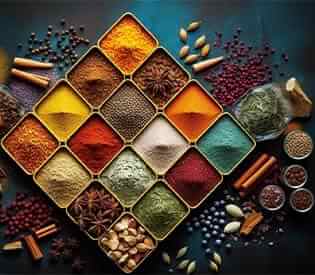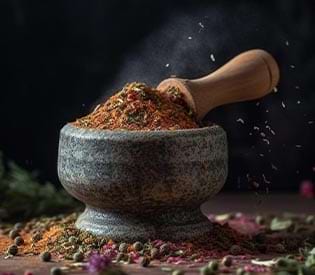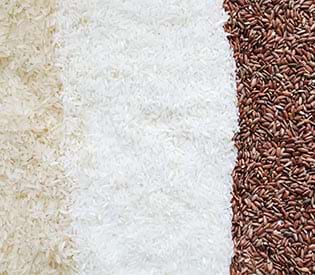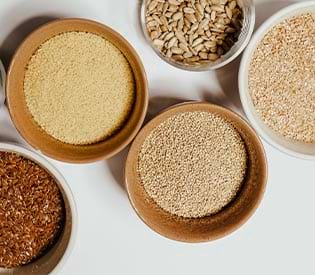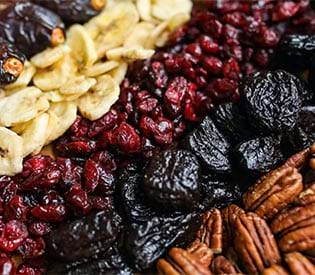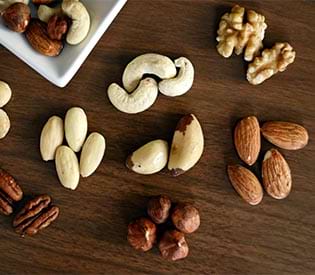Dried Basil Leaf
📦🚚 Fast & Free shipping on all orders
What is a basil leaf?
Basil is more than 4,000 years old. Basil was thought to have almost magical powers for a long time. It was used to treat snake bites and was thought to give people strength when they fasted for religious reasons. Ancient Egyptians used this herb to preserve the dead, leading to its discovery in Egyptian mummies. In ancient Greece, basil was a sign of sadness. Basileus phuton, which means "magnificent, royal, or kingly herb," was the name of the plant.
Basil is often called the "King of Herbs" these days. It used to be called the "herb of poverty" because people thought it would protect the poor. In India, this plant was thought to be a strong protector. They grew it around their temples and put it with the dead to protect them in the afterlife. Basil was thought to be a sign of the devil in Crete. They put this plant on their window sills to keep this evil away. Basil was also once thought to be a sign of purity. If the herb perished in a woman's hands, people viewed her as unclean.
Many doctors in the Middle Ages thought basil was poisonous. At the same time, some people thought that basil could "lift the spirit" and "clear the mind." Basil wasn't brought to Britain until the 1600s, and the British brought it to North America after that. Today, people grow basil throughout the Mediterranean region and in California.
How do I use basil leaves?
You can top pasta dishes, salads, and soups with basil leaves. Add it to sauces. Homemade pesto and tomato sauce, as well as many pasta sauces, both benefit from the addition of basil.
Basil leaf benefits:
Most people are aware of the use of sweet basil (Ocimum basilicum) in cooking. If you've used one of my meal plans, you may have noticed that I put it in everything. The Italian roots of my husband have rubbed off on me, and I love how sweet and fragrant basil is. However, various types of basil offer numerous additional benefits beyond their delicious flavor. It is very healthy because it has a lot of vitamin A (in the form of carotenoids), vitamin K, and vitamin C. It also has a lot of calcium, magnesium, iron, and potassium.
◉ Antioxidant and anti-inflammatory: Basil is beneficial for your health because it can help get rid of free radicals by acting as an antioxidant. Sweet basil contains large amounts of polyphenols and phenolic compounds, two types of antioxidants. Research from 2012 indicated that the antioxidants in basil make it a great choice for helping with diseases that cause inflammation.
◉ Antibacterial and Antimicrobial: Basil is also effective at killing bacteria and other microorganisms. In a 2013 study, basil essential oil was used to see how well it worked against Escherichia coli bacteria that were resistant to many drugs (E. coli). It killed every strain of E. coli used to test the basil essential oil. It was also shown to be antimicrobial, which means it can kill mold, yeast, and bacteria.
◉ Protect your stomach: Holy basil has been shown to improve the health of your body in many ways. It can help keep you from getting sick, lower your blood sugar and cholesterol, ease joint pain, and protect your stomach and joints.
◉ Ease inflammation and joint pain: Imagine being able to deal with stress, anxiety, and inflammation with a cup of tea made from the leaves of holy basil. Holy basil helps with all of these things because it is an adaptogen with anti-inflammatory and antioxidant properties. Even people with arthritis or fibromyalgia can benefit from it.
Where can I buy basil leaves?
Buy basil leaves from the health food store in the USA, Alive Herbals.
Basil leaf information (at a glance):
| Product Name | Basil Leaf. |
| Scientific Name | Ocimum basilicum. |
| Country of Origin |
Originally from India. |
| Ingredient |
Dried Basil Leaf. |
| Taste & Aroma |
Sweet basil smells fresh and tastes a little bit peppery with a hint of mint. |
| Shelf Life & Storage |
Shelf Life is about 3-4 years. The best way to store them is in a cool, dark place with a lid that keeps out air. |
| Precautions |
We requested that, Before consuming spices, herbs, teas or any kind of natural products, you consult an expert qualified healthcare practitioner or herbalist. |
| Note | This product information has not been appraised by the Food and Drug Administration (FDA). This information is solely intended for educational purposes. |

